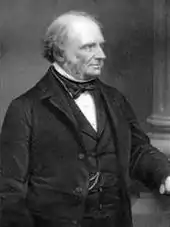1847 United Kingdom general election
The 1847 United Kingdom general election was conducted between 29 July 1847 and 26 August 1847 and resulted in the Whigs in control of government despite candidates calling themselves Conservatives winning the most seats. The Conservatives were divided between Protectionists, led by Lord Stanley, and a minority of free-trade Tories, known also as the Peelites for their leader, former prime minister Sir Robert Peel. This left the Whigs, led by Prime Minister Lord John Russell, in a position to continue in government.
| |||||||||||||||||||||||||||||||||||||||||||||
All 656 seats in the House of Commons 329 seats needed for a majority | |||||||||||||||||||||||||||||||||||||||||||||
|---|---|---|---|---|---|---|---|---|---|---|---|---|---|---|---|---|---|---|---|---|---|---|---|---|---|---|---|---|---|---|---|---|---|---|---|---|---|---|---|---|---|---|---|---|---|
| |||||||||||||||||||||||||||||||||||||||||||||
| |||||||||||||||||||||||||||||||||||||||||||||
|
|
|
The Irish Repeal group won more seats than in the previous general election, while the Chartists gained the only seat they were ever to hold, Nottingham's second seat, held by Chartist leader Feargus O'Connor.
The election also witnessed the election of Britain's first Jewish MP, the Liberal Lionel de Rothschild in the City of London. Members being sworn in were however required to swear the Christian Oath of Allegiance, meaning Rothschild was unable actually to take his seat until the passage of the Jews Relief Act in 1858.
Results

| Party | Seats | Gains | Losses | Net gain/loss | Seats % | Votes % | Votes | +/− | |
|---|---|---|---|---|---|---|---|---|---|
| Whig | 292 | +21 | 44.51 | 53.75 | 259,311 | +6.9 | |||
| Conservative | 325 | −42 | 49.54 | 42.59 | 205,481 | −8.2 | |||
| Irish Repeal | 36 | +16 | 5.49 | 2.93 | 14,128 | +1.0 | |||
| Chartist | 1 | 1 | 0 | +1 | 0.15 | 0.59 | 2,848 | 0 | |
| Irish Confederation | 2 | 2 | 0 | +2 | 0.30 | 0.14 | 661 | N/A | |
Voting summary
Seats summary
Great Britain
| Party | Candidates | Unopposed | Seats | Seats change | Votes | % | % change | |
|---|---|---|---|---|---|---|---|---|
| Conservative & Liberal Conservatives | 373 | 180 | 285 | 194,223 | 43.1 | |||
| Whig | 360 | 125 | 267 | 253,376 | 56.2 | |||
| Chartist | 9 | 0 | 1 | +1 | 2,848 | 0.6 | ||
| Total | 742 | 305 | 553 | 450,447 | 100 | |||
England
| Party | Candidates | Unopposed | Seats | Seats change | Votes | % | % change | |
|---|---|---|---|---|---|---|---|---|
| Conservative & Liberal Conservatives | 319 | 149 | 239 | 170,407 | 42.1 | |||
| Whig | 297 | 92 | 222 | 230,656 | 57.2 | |||
| Chartist | 9 | 0 | 1 | +1 | 2,848 | 0.7 | ||
| Total | 625 | 241 | 462 | 403,911 | 100 | |||
Scotland
| Party | Candidates | Unopposed | Seats | Seats change | Votes | % | % change | |
|---|---|---|---|---|---|---|---|---|
| Whig | 48 | 21 | 33 | +2 | 20,092 | 81.7 | +20.9 | |
| Conservative & Liberal Conservatives | 23 | 16 | 20 | −2 | 3,509 | 18.3 | −20.0 | |
| Total | 71 | 37 | 53 | 23,601 | 100 | |||
Wales
| Party | Candidates | Unopposed | Seats | Seats change | Votes | % | % change | |
|---|---|---|---|---|---|---|---|---|
| Conservative & Liberal Conservatives | 22 | 15 | 20 | 11,114 | 89.5 | |||
| Whig | 13 | 12 | 12 | 1,394 | 10.5 | |||
| Total | 35 | 27 | 32 | 12,508 | 100 | |||
Ireland
| Party | Candidates | Unopposed | Seats | Seats change | Votes | % | % change | |
|---|---|---|---|---|---|---|---|---|
| Irish Conservative | 38 | 24 | 29 | −1 | 10,294 | 31.0 | −6.1 | |
| Peelite | 11 | 9 | 11 | 964 | 3.0 | |||
| Irish Repeal | 51 | 18 | 36 | 14,128 | 43.6 | |||
| Whig | 33 | 11 | 25 | 5,935 | 20.2 | |||
| Irish Confederate | 3 | 0 | 2 | 629 | 2.0 | |||
| Independent | 1 | 0 | 0 | 32 | 0.2 | |||
| Total | 137 | 62 | 103 | 31,982 | 100 | |||
Universities
| Party | Candidates | Unopposed | Seats | Seats change | Votes | % | % change | |
|---|---|---|---|---|---|---|---|---|
| Conservative & Liberal Conservatives | 9 | 0 | 6 | 9,193 | 88.2 | |||
| Whig | 2 | 0 | 0 | 1,234 | 11.8 | |||
| Total | 11 | 0 | 6 | 10,427 | 100 | |||
Notes
- Including Peelites.
- Conservative totals include Liberal Conservatives.
References
- Craig, F. W. S. (1989), British Electoral Facts: 1832–1987, Dartmouth: Gower, ISBN 0900178302
- Rallings, Colin; Thrasher, Michael, eds. (2000), British Electoral Facts 1832–1999, Ashgate Publishing Ltd
.jpg.webp)


